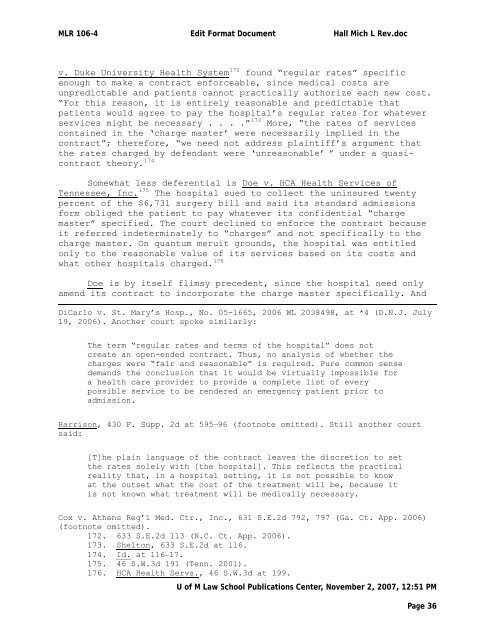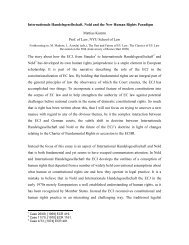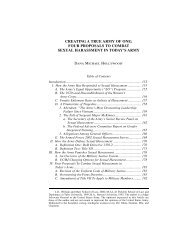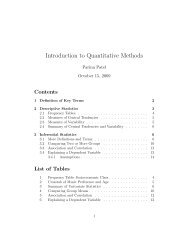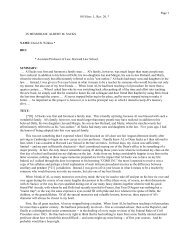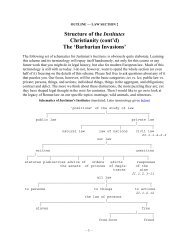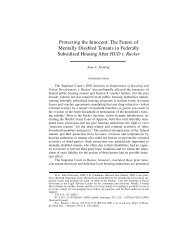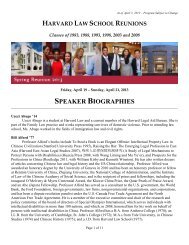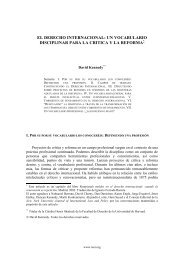Patients as Consumers - Harvard Law School
Patients as Consumers - Harvard Law School
Patients as Consumers - Harvard Law School
Create successful ePaper yourself
Turn your PDF publications into a flip-book with our unique Google optimized e-Paper software.
MLR 106-4 Edit Format Document Hall Mich L Rev.doc<br />
v. Duke University Health System 172 found “regular rates” specific<br />
enough to make a contract enforceable, since medical costs are<br />
unpredictable and patients cannot practically authorize each new cost.<br />
“For this re<strong>as</strong>on, it is entirely re<strong>as</strong>onable and predictable that<br />
patients would agree to pay the hospital’s regular rates for whatever<br />
services might be necessary . . . .” 173 More, “the rates of services<br />
contained in the ‘charge m<strong>as</strong>ter’ were necessarily implied in the<br />
contract”; therefore, “we need not address plaintiff’s argument that<br />
the rates charged by defendant were ‘unre<strong>as</strong>onable’ ” under a qu<strong>as</strong>icontract<br />
theory. 174<br />
Somewhat less deferential is Doe v. HCA Health Services of<br />
Tennessee, Inc. 175 The hospital sued to collect the uninsured twenty<br />
percent of the $6,731 surgery bill and said its standard admissions<br />
form obliged the patient to pay whatever its confidential “charge<br />
m<strong>as</strong>ter” specified. The court declined to enforce the contract because<br />
it referred indeterminately to “charges” and not specifically to the<br />
charge m<strong>as</strong>ter. On quantum meruit grounds, the hospital w<strong>as</strong> entitled<br />
only to the re<strong>as</strong>onable value of its services b<strong>as</strong>ed on its costs and<br />
what other hospitals charged. 176<br />
Doe is by itself flimsy precedent, since the hospital need only<br />
amend its contract to incorporate the charge m<strong>as</strong>ter specifically. And<br />
DiCarlo v. St. Mary’s Hosp., No. 05-1665, 2006 WL 2038498, at *4 (D.N.J. July<br />
19, 2006). Another court spoke similarly:<br />
The term “regular rates and terms of the hospital” does not<br />
create an open-ended contract. Thus, no analysis of whether the<br />
charges were “fair and re<strong>as</strong>onable” is required. Pure common sense<br />
demands the conclusion that it would be virtually impossible for<br />
a health care provider to provide a complete list of every<br />
possible service to be rendered an emergency patient prior to<br />
admission.<br />
Harrison, 430 F. Supp. 2d at 595–96 (footnote omitted). Still another court<br />
said:<br />
[T]he plain language of the contract leaves the discretion to set<br />
the rates solely with [the hospital]. This reflects the practical<br />
reality that, in a hospital setting, it is not possible to know<br />
at the outset what the cost of the treatment will be, because it<br />
is not known what treatment will be medically necessary.<br />
Cox v. Athens Reg’l Med. Ctr., Inc., 631 S.E.2d 792, 797 (Ga. Ct. App. 2006)<br />
(footnote omitted).<br />
172. 633 S.E.2d 113 (N.C. Ct. App. 2006).<br />
173. Shelton, 633 S.E.2d at 116.<br />
174. Id. at 116–17.<br />
175. 46 S.W.3d 191 (Tenn. 2001).<br />
176. HCA Health Servs., 46 S.W.3d at 199.<br />
U of M <strong>Law</strong> <strong>School</strong> Publications Center, November 2, 2007, 12:51 PM<br />
Page 36


